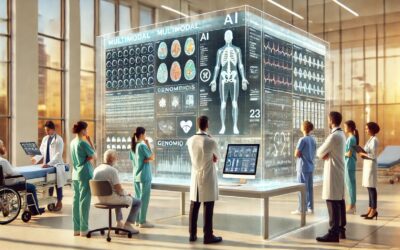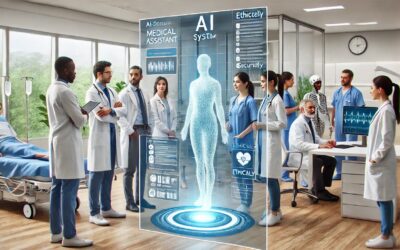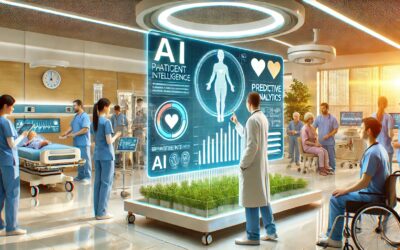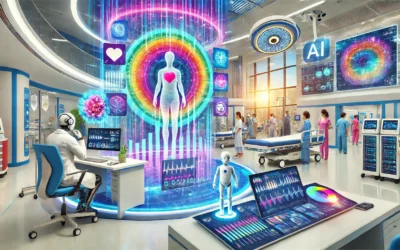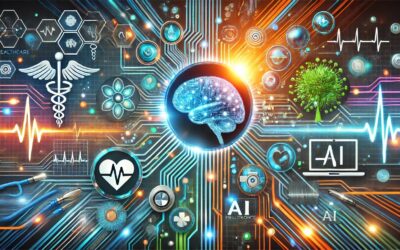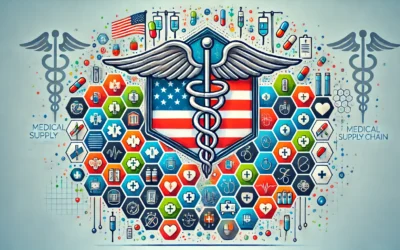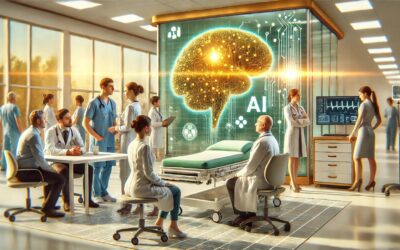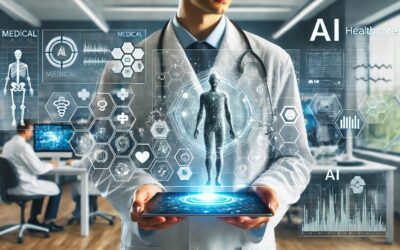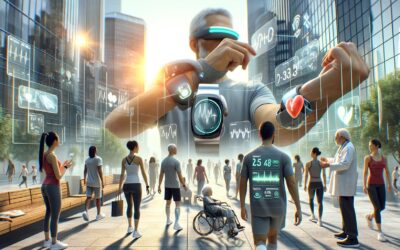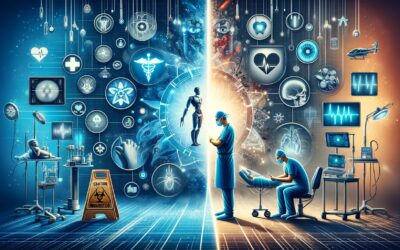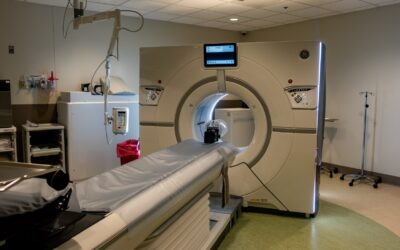Insights
Human Oversight and Conscience in Healthcare AI
Healthcare has long understood that safety depends on process, not perfection. Checklists, timeouts, and structured handoffs exist to prevent the predictable human errors that arise in complex environments. These principles—refined through aviation safety models and...
Governance Over Fear: Building Safe, Transparent Healthcare AI
When new ideas challenge long-held medical beliefs, fear often delays progress. In the 1980s, researchers Barry Marshall and Robin Warren were ridiculed for suggesting that a bacterium, Helicobacter pylori, caused most ulcers. Years passed before the medical community...
Adoption Curves: Managing Change in Healthcare AI
Change has always been uncomfortable. Clinicians trained for decades to master their craft often find new technologies disruptive, slowing down well-established routines. Patients, too, hesitate when asked to manage their health differently, even when change promises...
Building the AI Social Contract
The idea of a “social contract” is as old as political philosophy itself. Thinkers from Hobbes to Rousseau argued that individuals willingly surrender some autonomy to governing bodies in exchange for protection and order. The contract legitimizes authority by...
Trust in Healthcare AI: Lessons for Leaders
Healthcare has always struggled to balance innovation with trust. In the early 1990s, as personal computers became affordable and the Internet became widespread in hospitals, electronic health records (EHRs) promised a revolution. Paper records were hard to access,...
Who Should Lead AI in Healthcare?
This summer, I explored how artificial intelligence is reshaping healthcare—and why its most significant potential will remain untapped unless we change not only how we use it, but who leads its deployment. AI is no longer theoretical. It is here, embedded in...
AI Must Augment Clinical Judgment, Not Replace It
In aviation, the path to safety was paved not by better engines but by better communication. In the aftermath of several deadly airline accidents in the 1970s, the problem was not mechanical—it was human. Pilots and crew failed to speak up, share critical...
Debunking 5 Common Myths About Healthcare AI
Despite the breathless headlines and lofty promises, artificial intelligence in healthcare is not a magic bullet. It is not sentient, intuitive, or even particularly wise. It is a tool—and like any tool, its effectiveness depends entirely on how it is designed,...
Why I Ride: 41 Years for Cancer Research
On August 2–3, I will once again ride 192 miles across Massachusetts in the Pan-Mass Challenge (PMC), an extraordinary event that raises critical funds for cancer research at the Dana-Farber Cancer Institute. This year marks my 41st consecutive PMC ride.It also marks...
The Missing Clinical Voice in Healthcare AI Policy
In February 2024, I published Future Healthcare 2050: How AI Transforms the Patient-Physician Journey to provide a roadmap for healthcare professionals, executives, and innovators facing the rapid emergence of artificial intelligence. Four months later, the World...
The Cost of Truth: A July 4 Reflection
This Independence Day reflection explores how civic duty and medical ethics intersect in the age of AI. Watch the full video and read the essay below. On Independence Day, we honor service, sacrifice, and the enduring values that define our democracy. For many of us,...
Future Healthcare 2050 Outpaces WEF AI Report
In February 2025, I released Future Healthcare 2050 with a clear message: artificial intelligence will only transform healthcare if we lead with ethics, transparency, and human judgment. Four months later, the World Economic Forum released its white paper, Earning...
What We Learned from Future Healthcare 2050
For the past 21 weeks, we have explored how artificial intelligence can reshape the healthcare system—if we lead it with intention. We began with a foundational question: Can AI support—not replace—the patient-physician relationship? What followed was a...
Patient-Physician Journey to 2050 with Healthcare AI
n 1959, physicist Harold Hopkins developed the rod-lens optical system—a breakthrough that redefined how physicians could visualize internal structures during surgery. Just a year later, medical instrument maker Karl Storz partnered with Hopkins to adapt this system...
Preparing the Healthcare Workforce for AI
In 1965, the U.S. Postal Service introduced optical character recognition (OCR) in a Baltimore post office, marking a turning point in technological adaptation. Apprehensive about job loss, the erosion of their skills, and the new system's reliability, workers...
Healthcare AI: Honoring Legacy and Trust
As Memorial Day passes, I pause to reflect on national service and personal legacy. My grandfather traveled to the U.S. as a teenager, fleeing tyranny in Eastern Europe. He joined the U.S. Army in World War I and fought in the trenches in France. His service allowed...
Preventing Misinformation from AI in Healthcare
On October 30, 1938, Orson Welles delivered one of the most consequential radio broadcasts in American history. His adaptation of War of the Worlds, presented as a series of simulated news bulletins, left listeners in a state of panic. Despite disclaimers and the...
Aligning Healthcare AI with Human Judgment and Ethics
In 1847, Hungarian physician Dr. Ignaz Semmelweis made a life-saving discovery: handwashing reduced maternal deaths during childbirth. Yet the medical establishment rejected his findings for decades. His evidence gained the respect it deserved only with the later...
Balancing Risk and Reward in Healthcare AI
In 1976, U.S. health officials launched an unprecedented national vaccination campaign against a newly identified swine flu strain at Fort Dix, New Jersey. Fearful of a pandemic, the federal government quickly vaccinated millions. However, the rapid deployment—driven...
Healthcare AI: Privacy and Cybersecurity
In 1928, U.S. Supreme Court Justice Louis Brandeis famously defined privacy as "the right to be let alone." His warning arose during a time when wiretaps threatened the sanctity of private conversations. Nearly a century later, Brandeis's concerns have only...
AI’s Impact on Healthcare Jobs
In 1785, Edmund Cartwright introduced the power loom, a revolutionary invention that mechanized textile production. At first, skilled weavers fiercely resisted the change, fearing for their livelihoods. Yet by 1850, the mechanization Cartwright initiated had created...
AI and the Future Economics of Patient Care
In 1913, Henry Ford changed the world. By introducing the moving assembly line at Ford Motor Company, he slashed production time for the Model T from 12 hours to just 93 minutes. Ford's innovation made automobiles affordable for ordinary Americans and revolutionized...
Can AI Make Healthcare Safer and More Reliable?
In 1904, Dr. Ernest Amory Codman began advocating for a radical idea: healthcare institutions should track every patient's outcome to understand whether treatments were successful. His “End Result System” was the first structured attempt to evaluate healthcare...
How AI Drives Discovery: Faster Trials, Smarter Insights
In 1747, aboard the HMS Salisbury, Scottish physician James Lind conducted what is now recognized as the first controlled clinical trial. Faced with the deadly scourge of scurvy among sailors, Lind divided twelve afflicted crew members into pairs, administering...
Why Virtual Assistants Belong in Healthcare
In 1966, Joseph Weizenbaum of MIT developed ELIZA, one of the first computer programs to mimic human conversation. Though primitive by today's standards, ELIZA simulated a Rogerian psychotherapist using scripted prompts to reflect user input. It was a groundbreaking...
AI Should Augment, Not Replace, Human Expertise
In 1816, René Laennec revolutionized medicine with the invention of the stethoscope, enabling physicians to listen to internal body sounds with greater clarity while maintaining patient modesty. This simple tool was a breakthrough—not because it replaced the...
AI Is Transforming Healthcare Delivery: Are You Ready?
In 1954, Dr. Homer Warner pioneered the use of computers in cardiology at LDS Hospital in Salt Lake City, demonstrating that technology could assist clinicians in decision-making by generating alerts, reminders, and recommendations. Seven decades later, artificial...
Synergizing AI and Predictive Analytics
In 1855 Florence Nightingale pioneered statistical analysis during the Crimean War to predict and prevent hospital deaths. By meticulously collecting and analyzing mortality data, she demonstrated that poor sanitation was killing more soldiers than battlefield...
Why Multimodal Healthcare AI is a Game-Changer
In 1906, scientist Santiago Ramón y Cajal made a revolutionary breakthrough in neuroscience by doing something simple in retrospect: he combined different ways of seeing. By integrating microscopic observation with detailed drawings and theoretical insights, he...
The Risk of Monocultural LLMs
Artificial intelligence (AI) is transforming healthcare, but its success depends on how well we train and regulate these systems. Large Language Models (LLMs) hold immense potential to enhance diagnostics, streamline workflows, and support clinical decision-making....
Unlocking AI’s Potential to Enhance Care
Under the Cover of Future Healthcare 2050 Artificial intelligence (AI) is reshaping the future of healthcare, offering unparalleled opportunities to improve care delivery, empower clinicians, and enhance patient outcomes. However, this transformation is not simply...
Top Challenges for AI Adoption
Overcoming Barriers Artificial intelligence (AI) has the potential to transform healthcare, from enabling earlier diagnoses to optimizing treatment plans. Yet, despite its incredible promise, many organizations struggle to implement AI successfully. Barriers such as...
How Technology is Changing Care
For decades, the patient-physician relationship was the foundation of healthcare. At its core, this relationship is built on trust, communication, and shared decision-making. However, technological advances transform this dynamic, offering exciting opportunities to...
What Healthcare Leaders Must Know About AI in 2025
Artificial intelligence (AI) is no longer a futuristic concept in healthcare—it is here, and it is transforming how we diagnose, treat, and manage patient care. From predictive analytics to personalized medicine, AI offers unprecedented opportunities to enhance...
Future of Healthcare AI: HHS National Strategy
The U.S. Department of Health and Human Services (HHS) just released its comprehensive Strategic Plan for Healthcare AI, presenting an ambitious roadmap across seven critical domains: medical research and discovery, medical product development, healthcare delivery,...
Treat Medical Supplies as National Security Assets
In the wake of Hurricane Helene's devastating impact on a critical manufacturing plant in North Carolina, the United States grapples with another medical supply crisis. This time, it is a shortage of essential IV fluids that threatens patient care across the nation....
Charting an Ethical AI Course: The LLM Challenge, Part 2
(5 minute read) As Large Language Models (LLMs) continue to make significant inroads into healthcare, as discussed in Part 1 of this series, we find ourselves at a critical juncture. The potential benefits of these AI systems are immense, but so too are the ethical...
Balancing Innovation and Ethics: The LLM Challenge, Part 1
(7 minute read) The rapid advancement of artificial intelligence (AI) has opened up a world of possibilities for healthcare. At the forefront of this revolution are large Language Models (LLMs), sophisticated AI systems capable of understanding and generating...
Beyond Black Box AI: Gain Trust with Transparency
( 6 minute read) The rapid advancement of artificial intelligence (AI) in healthcare has ushered in a new era of possibilities, promising not just improved patient outcomes, but also enhanced operational efficiency, and groundbreaking research. This wave of innovation...
Will Hackers Derail AI-Driven Healthcare?
(6 minute read) Artificial Intelligence (AI) and large language models (LLMs) are revolutionizing healthcare, offering unprecedented opportunities to enhance patient care, streamline operations, and drive innovation. However, as we embrace these transformative...
Patient Needs or Profits: FTC’s Role Ensuring Fair Drug Pricing
( 5 minute read) The high price and steep increases in the price of prescription drugs in the United States significantly contribute to the rise in healthcare costs. While pharmaceutical companies argue that these prices are necessary to fund research and development,...
Responsibly Balance AI Innovation and Efficiency
(6 minute read) As artificial intelligence (AI) continues evolving rapidly, healthcare leaders grapple with the potential benefits and risks of integrating these powerful tools into patient care. While AI holds immense promise for transforming healthcare delivery,...
AI: Balancing Innovation, Transparency, and Patient Trust
(4 minute read) As artificial intelligence (AI) continues transforming the healthcare industry, the ethical use of patient data has become a pressing concern. Recent revelations about tech giants like OpenAI, Google, and Meta using copyrighted material without...
Collaborative Intelligence: Synergizing AI and Human Expertise
(5 minute read) Artificial intelligence (AI) holds immense potential to revolutionize healthcare by improving patient outcomes, reducing costs, and optimizing clinical processes. However, realizing this promise requires a thoughtful approach to developing AI models,...
The Price of Progress: Protecting Patient Privacy in the Age of AI
(6 minute read) As artificial intelligence (AI) continues to revolutionize industries across the globe, its impact on healthcare is becoming increasingly apparent. From diagnosis and treatment planning to drug discovery and clinical trials, AI has the potential to...
Why Every Healthcare Organization Needs a Chief AI Officer
(6 minute read) As artificial intelligence (AI) rapidly transforms industries and reshapes organizations’ operations, the need for dedicated leadership to navigate this complex landscape has become increasingly apparent. Just as the introduction of electronic medical...
Perverse Incentives Drive Patient Costs
(6 minute read) The recent New York Times investigation into the practices of MultiPlan, a little-known data analytics firm that works with major health insurers to determine reimbursements for out-of-network medical claims, highlights the dangers of perverse...
Transformative Health Tech: Focus on Outcomes, Privacy, Workflow
(7 minute read) The emergence of wearable digital health technologies (DHTs) can revolutionize healthcare by providing personalized, data-driven insights into patients’ health and well-being. As these technologies progress from experimental applications to routine use...
Protect Patients from AI-Driven Misinformation
(6 minute read) The proliferation of health misinformation, a complex and formidable issue, was underscored by a recent Supreme Court case involving the Biden administration’s battle against false COVID-19 vaccine claims on social media. As a healthcare information...
The Critical Role of Outcome-Centric AI Regulation
(8 minute read) As artificial intelligence (AI) rapidly evolves from a futuristic vision to a tangible reality, we must prioritize patient outcomes in developing AI-driven care tools. A recent article in JAMA underscores this view by exploring how harnessing AI can...
Standards Needed for AI-Generated Clinical Summaries
( 5 minute read) The advent of artificial intelligence (AI) in generating clinical summaries has presented unparalleled opportunities and significant challenges. We must navigate these waters with caution and foresight as we stand on the cusp of integrating these...
Legal Liability of AI: How Do We Protect Patients?
(5 minute read) Integrating Artificial Intelligence (AI) into healthcare heralds a new era in medical innovation. While AI offers groundbreaking potential in enhancing patient care and operational efficiency, it simultaneously introduces a complex array of legal and...
Dual Edges of AI: Innovation vs. Patient Safety
(5 minute read) As artificial intelligence (AI) in healthcare delivery accelerates, the imperative to prioritize patient safety cannot be overstated. Integrating AI into clinical settings presents a revolutionary opportunity to enhance the quality of care, patient...
The Battle Over Drug Costs and Care Equity
(5 minute read) The United States healthcare system is a complex interplay of providers, insurers, and pharmaceutical companies, each navigating a landscape where the cost of care and medications significantly surpasses that of other countries. A January 25, 2024...
The Need for Ethical AI Surveillance Guardrails
(3 minute read) A thought-provoking piece by The Guardian, titled” ‘Constantly monitored’: the pushback against AI surveillance at work,” scrutinizes the escalating deployment of Artificial Intelligence (AI) in monitoring workplace activities. This article serves as...
Does Private Equity Ownership Enhance Patient Care?
(2 minute read) While private equity (PE) strives to reduce costs and increase profits in companies it purchases, a recent JAMA article provides evidence that such purchases lead to an increase in adverse events and an overall decrease in quality of care. The study...
Beyond Human Limits: The Potential of AI in Medical Diagnostics
(4 minute read) Integrating Artificial Intelligence (AI) in medical diagnostics has been a subject of extensive research and debate. A recent study published in the New England Journal of Medicine AI, “Use of GPT-4 to Diagnose Complex Clinical Cases,” provides...
Beyond Medicare: Inflation Reduction Act Impact
(3 minute read) The Inflation Reduction Act (IRA) of 2022 broadly impacts prescription drug prices in the United States and changes state Medicaid and employee health plans. The IRA introduces significant modifications to how Medicare pays for prescription drugs....
Don’t Believe Everything You Read
(2 minute read) When we look to buy something online, we first scan the reviews to see what others are saying about the product. However, we have learned over the years that some reviews are more valuable than others, as posting fake reviews is rampant throughout the...
AI Races Ahead with Government Left Behind
(2 minute read) Considering the frantic pace of artificial intelligence (AI) development, it is hard to envision the government properly regulating AI to facilitate its benefits while limiting its harm. With AI technology available to any nation-state, no global...
Setting Proper Metrics to Balance Care With Profits
(2 minute read) The effort by physicians and pharmacists to unionize to take control of their workplace indicates that company profits take precedence over clinical outcomes and the patient experience. While analytics and its metrics are essential to ensure desired...
Understanding Q*: Can Computers Conduct Thought Experiments?
(6 minute read) The recent development of OpenAI’s Q* algorithm (Q-Star), as described in Shelly Palmer’s article “Understanding OpenAI’s Rumored Humanity-Ending Algorithm,” presents a groundbreaking advancement in artificial intelligence (AI). While still in the...
AI’s Double-Edged Sword: Calling for Vigilance on Misinformation
(2 minute read) Healthcare artificial intelligence (AI) stands as a beacon of innovation and efficiency for patient care. However, a recent study published in JAMA Internal Medicine casts a shadow on this technological marvel, revealing a concerning facet: the...
Revolutionizing Clinical Trials: Emergence of AI and NLP
(2 minute read) Artificial Intelligence (AI) is rapidly transforming the landscape of clinical research, offering promising avenues to overcome longstanding challenges in clinical trials. A recent article in JAMA Cardiology, highlighted in an editorial in JAMA, delves...
Prompt Engineering = Job Security
(2 minute read) You may be wondering if artificial intelligence will take your job. Factory workers over the past 30 years thought the same about robots. And yes, many lost their jobs. But those who adapted and got retraining not only survived but thrived. When...
U.S. Infant Mortality Trends Unacceptable
(2 minute read) The Centers for Disease Control reports a 3 percent increase in infant mortality in the U.S., reaching 5.6 deaths per 1,000 live births. This uptick represents a trend that had a nearly continuous decline since 1995. Infant mortality, defined as the...
Let’s Get the Data to Deliver Healthcare Safely
(2 minute read) After numerous accidents and deaths, in 1976, the Federal Aviation Administration launched the Aviation Safety Reporting System (ASRS) to collect data on all errors, mishaps, and mistakes in commercial and private aviation. From pilot captains to...
Our Duty of Care
(2 minute read) When I see my healthcare provider, I trust that they have my best interests at heart. I bet you do, too. But what is the basis for our trust in them? “Duty of Care” is a framework that governs the conduct and responsibilities of healthcare providers....
Predictive Models to Drive Treatments
(2 minute read) Google’s DeepMind developed AlphaFold, the first AI-driven system that predicts the structure of proteins. Why is that important? The interaction of molecules forms the basis of biology. The protein structure, made up of chains of amino acids,...
Drug Development Accelerated by AI
(2 minute read) Under constant pressure to develop new drugs and treatments, the pharmaceutical industry struggles to manage development costs. Drug development is notoriously slow, costly, and fraught with risk. The process involves: Identifying a drug target....
Healthcare AI Opportunities Available Now
(2 minute read) Artificial intelligence (AI) adoption in healthcare lags behind other sectors like finance and retail, generally paralleling the overall use of information technology. Challenges to using AI include the complexity of healthcare data, integration...
Middlemen Win Big From Healthcare Spending
(2 minute read) For 17% of GDP, we receive shorter lifespans and higher infant mortality. While most ire is directed at hospitals and pharmaceutical companies, middlemen or intermediaries – insurers, pharmacies, drug distributors, and pharmacy benefit managers (PBMs)...
Medication Errors: Fix the Machine
(5 minute read) Medication errors, a significant concern in the healthcare sector, are preventable events that may lead to inappropriate medication use and patient harm. These errors can occur at any stage of the medication use process, including prescribing,...
Are You Using Your Dark Data Effectively?
Physicists believe that dark matter makes up 85% of the matter in the universe. That percentage is less than some experts estimate is the dark data in most companies. IBM believes that dark data represents 90% of data collected, while others think it is as low as 50%....
Effectively Leverage Analytics for Value Optimization
In an era where data is often referred to as the "new oil," the ability to harness its power effectively is crucial for organizations across various sectors. Embedded analytics and value optimization have emerged as pivotal tools, offering a robust framework for...
Radiomics: Decision Support Leveraging AI and Analytics
(4 minute read) Radiomics, a field at the intersection of medical imaging and data science, is rapidly transforming the healthcare landscape. This innovative discipline leverages computer vision to perform high-throughput extraction of large amounts of quantitative...
Computer Vision & Analytics are Transforming Medical Imaging
(3 minute read) As a physician and a specialist in health information technology, I have witnessed firsthand the transformative power of technology in healthcare. One such technology that has been making waves in recent years is computer vision. This powerful tool,...
For Want of a $25 Drug: Fixing Medication Shortages
The old proverb "For Want of a Nail," having numerous variations over several centuries, reminds us that seemingly unimportant acts or omissions can have grave and unforeseen consequences. Two inexpensive cancer drugs, costing under $25 per vial, cisplatin, and...
Unleashing Precision Medicine to Deliver Personalized Care
(5 minute read) Precision medicine, also known as personalized medicine, is a modern approach to healthcare that considers individual variability in genes, environment, and lifestyle for each person. This approach allows doctors and researchers to predict more...
Turn and Face the Strange, Changes
Implementing change in a healthcare setting is a complex endeavor, with the challenges varying significantly between staff who provide direct patient care and those who do not. For those providing direct patient care, changes in processes and workflows can directly...
Deadly Medication Shortages: Time for a Fix
The United States is currently grappling with a critical issue that threatens the health and well-being of its citizens: a shortage of essential medications. This crisis has been escalating over the past few years and has severe implications for patient care, with...
Maximizing Hospital Assets with Predictive Analytics
Analytics has revolutionized how we approach various business and healthcare management. In healthcare, efficiently utilizing resources such as facilities, equipment, and staff is critical to providing the best medical care to patients. Limited resources, however,...
What Gerrymandering Teaches Us About Population Health
The 2016 election yielded 13 Republican and five Democratic congressmen representing the state of Pennsylvania. Although Republican congressional candidates won about 50% of the statewide vote, they currently hold 72% of the available House seats. In a country of “one...
Unlocking Personalized Medicine Through Interoperability
As medicine marches toward its embrace of personalized medicine and immunotherapy, researchers struggle to obtain meaningful discoveries that can be applied to the ever-expanding number of patient cohorts. The growth in the understanding and use of genetic testing...
Reining in Rising Drug Spending in the U.S.
Although overall healthcare cost inflation remains relatively small, healthcare spending just passed 18 percent of the nation’s gross domestic product at the end of 2015. Because of the size of healthcare as a component of the nation’s expenditures, this continued...
Why Healthcare Can’t Afford Bad Jobs
For almost 50 years, provider organizations got a free ride. Unlike other industries that faced market disruptions that required constant adjustment to survive, healthcare existed as a fairly stable, predictable industry. As provider organizations expanded services,...




























